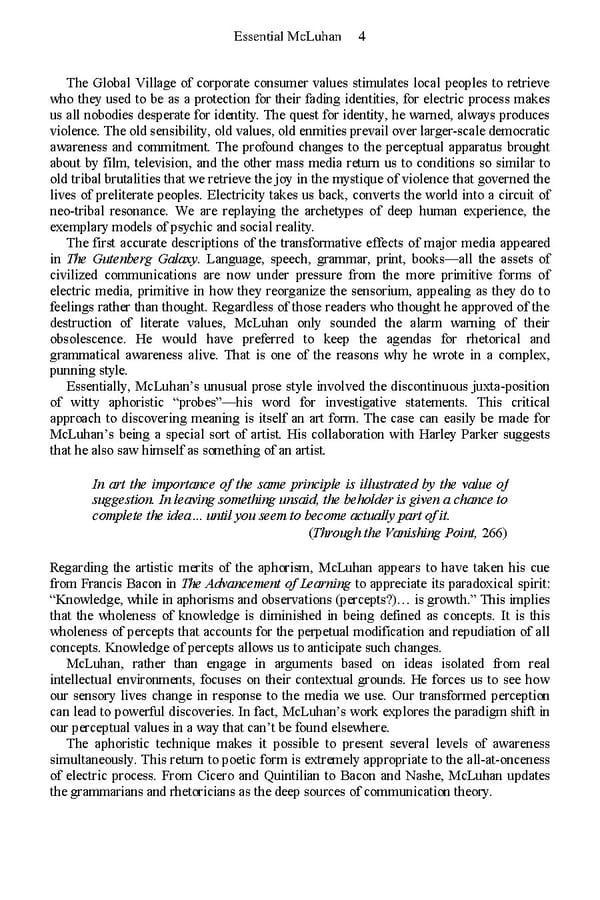Essential McLuhan 4 The Global Village of corporate consumer values stimulates local peoples to retrieve who they used to be as a protection for their fading identities, for electric process makes us all nobodies desperate for identity. The quest for identity, he warned, always produces violence. The old sensibility, old values, old enmities prevail over larger-scale democratic awareness and commitment. The profound changes to the perceptual apparatus brought about by film, television, and the other mass media return us to conditions so similar to old tribal brutalities that we retrieve the joy in the mystique of violence that governed the lives of preliterate peoples. Electricity takes us back, converts the world into a circuit of neo-tribal resonance. We are replaying the archetypes of deep human experience, the exemplary models of psychic and social reality. The first accurate descriptions of the transformative effects of major media appeared in The Gutenberg Galaxy. Language, speech, grammar, print, books—all the assets of civilized communications are now under pressure from the more primitive forms of electric media, primitive in how they reorganize the sensorium, appealing as they do to feelings rather than thought. Regardless of those readers who thought he approved of the destruction of literate values, McLuhan only sounded the alarm warning of their obsolescence. He would have preferred to keep the agendas for rhetorical and grammatical awareness alive. That is one of the reasons why he wrote in a complex, punning style. Essentially, McLuhan’s unusual prose style involved the discontinuous juxta-position of witty aphoristic “probes”—his word for investigative statements. This critical approach to discovering meaning is itself an art form. The case can easily be made for McLuhan’s being a special sort of artist. His collaboration with Harley Parker suggests that he also saw himself as something of an artist. In art the importance of the same principle is illustrated by the value of suggestion. In leaving something unsaid, the beholder is given a chance to complete the idea… until you seem to become actually part of it. (Through the Vanishing Point, 266) Regarding the artistic merits of the aphorism, McLuhan appears to have taken his cue from Francis Bacon in The Advancement of Learning to appreciate its paradoxical spirit: “Knowledge, while in aphorisms and observations (percepts?)… is growth.” This implies that the wholeness of knowledge is diminished in being defined as concepts. It is this wholeness of percepts that accounts for the perpetual modification and repudiation of all concepts. Knowledge of percepts allows us to anticipate such changes. McLuhan, rather than engage in arguments based on ideas isolated from real intellectual environments, focuses on their contextual grounds. He forces us to see how our sensory lives change in response to the media we use. Our transformed perception can lead to powerful discoveries. In fact, McLuhan’s work explores the paradigm shift in our perceptual values in a way that can’t be found elsewhere. The aphoristic technique makes it possible to present several levels of awareness simultaneously. This return to poetic form is extremely appropriate to the all-at-onceness of electric process. From Cicero and Quintilian to Bacon and Nashe, McLuhan updates the grammarians and rhetoricians as the deep sources of communication theory.
 Essential McLuhan Page 10 Page 12
Essential McLuhan Page 10 Page 12